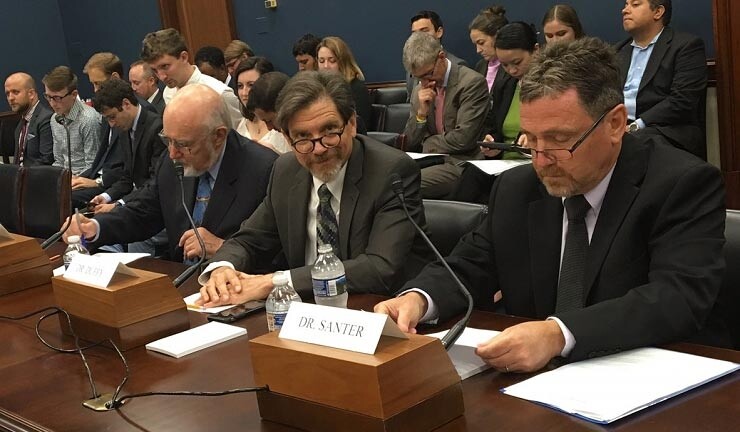
The first panel of experts at the House Science Committee Democrats’ climate change roundtable. Left to right: Bernard Goldstein, Philip Duffy, and Benjamin Santer.
(Image credit – House Science Committee Democrats)
On June 20, House Science Committee Ranking Member Eddie Bernice Johnson (D-TX) convened a roundtable
In her opening remarks
Free to invite whatever panelists they chose, Johnson and Rep. Don Beyer (D-VA), the committee’s vice ranking member, showcased perspectives in line with those represented by the Intergovernmental Panel on Climate Change (IPCC) and the Paris Climate Agreement.
The first of two panels at the roundtable comprised scientific experts: Benjamin Santer, an atmospheric scientist at Lawrence Livermore National Laboratory and a prominent figure in the climate science community; Philip Duffy, president of Woods Hole Research Center and a former senior official in the White House Office of Science and Technology Policy; and Bernard Goldstein, an emeritus professor of environmental and occupational health at the University of Pittsburgh.

The first panel of experts at the House Science Committee Democrats’ climate change roundtable. Left to right: Bernard Goldstein, Philip Duffy, and Benjamin Santer.
(Image credit – House Science Committee Democrats)
In his opening remarks
In his remarks
Although the roundtable aspired to spotlight the most pressing problems of climate science, common criticisms of the scientific consensus also figured into the discussion. Panel members disputed claims such as that satellite readings of tropospheric temperatures are inconsistent with the IPCC’s accepted rate of climatic warming and that greenhouse gas reduction commitments made through the Paris agreement would only negligibly slow the rate of sea level rise.
Asked by Johnson about the suggestion
The second panel comprised policy experts who back the Paris agreement: Christiana Figueres, the former executive secretary of the United Nations Framework Convention on Climate Change; David O’Sullivan, the European Union’s ambassador to the U.S.; Jonathan Elkind, who served as the Department of Energy’s assistant secretary for international affairs under President Obama; and Manish Bapna, the managing director of the World Resources Institute think tank.
This panel argued that the transition to clean energy is, in O’Sullivan’s words, “frankly unstoppable,” and emphasized the economic case for participation in the Paris agreement. They also underscored the simplicity and flexibility of the agreement, noting that every nation has the power to establish and revise its commitments.
A crucial part of wealthier nations’ commitment to participating in the Paris agreement is the R&D necessary to achieve a low-carbon economy, which the panel agreed would pay major economic dividends to the nations conducting it. O’Sullivan noted that the EU is stepping up its own R&D investment toward this goal to more than €1.1 billion per year.
Elkind stressed that U.S. innovation strategy should distinguish between near-term and long-term goals, saying,
It’s not just a question of coming up with the new, whiz-bang technology that’s going to allow us to do things we never thought that we could do. It’s also about pushing down costs progressively.
As the Trump administration has worked to reverse President Obama’s climate policies, many proponents of climate change mitigation have decided to proceed on their own. Most notably, after President Trump announced the U.S. will withdraw from the Paris agreement, many state and local governments, corporations, and individuals announced
The Democrats’ decision to hold their own roundtable reflected the go-it-alone spirit of the moment, but Johnson and the roundtable participants also expressed a desire to forge national climate policies through bipartisan agreements. Members of the second panel, in particular, urged that piecemeal efforts are no substitute for a coordinated national policy and international leadership the U.S. can provide. Bapna added that it would become particularly difficult for states to carry the burden once commitments become more aggressive in the post-2025 timeframe.
Johnson asked both panels for their views on how to move beyond current partisan divides. This was a problem on which Goldstein focused most of his remarks, urging that “righteous indignation” should be avoided and that alliances be cultivated with conservative-leaning individuals in agriculture and the military who have a clear stake in climate policy. Figueres recommended stressing the short-term economic and health benefits that will accompany action toward the decarbonization of energy regardless of one’s concerns about climate change.
Although the partisan divide over climate change is as stark as it has ever been, there have recently been signs that some of the old battle lines could be fading. For instance, while Secretary of State Rex Tillerson’s climate-related actions during his time as CEO of ExxonMobil are currently
As far as the House Science Committee is concerned, though, bipartisan cooperation on climate issues is likely to prove elusive for the foreseeable future.